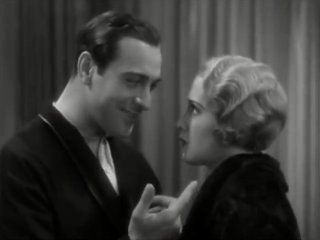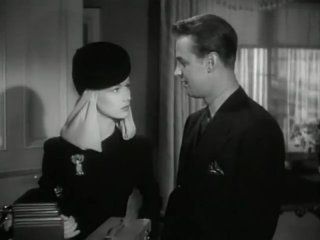If I'm peddling it, I'm selling it to the highest bidder.

Did me up a Dashiell Hammett double feature this afternoon, starting with the first adaptation of The Maltese Falcon from 1931. It's a film that has long stood in the shadow of John Huston's superior remake, but it's still worth seeing, and not just for the novelty value. Even if Ricardo Cortez plays Sam Spade like a grinning idiot at times and the story has been streamlined, which takes some of the mystery out of its mystery, the fact that this Falcon came out before the enforcement of the Production Code allowed it to be a lot more frank about things like Spade's infidelity with his partner's wife (Thelma Todd) and the physical nature of his relationship with Bebe Daniels's Ruth Wonderly, the client with the simple missing-sister case that turns out to be anything but. And it would be impossible not to pick up on the implication when Spade's able secretary Effie (Una Merkel) informs him that he has a "gorgeous new customer" waiting to see him and it turns out to be the effete Dr. Joel Cairo (Otto Matieson, who doesn't hold a candle to Peter Lorre, but who could?).
Another bit of casting that doesn't measure up to the remake is Dudley Digges as the boisterous Casper Gutman, but I rather liked Dwight Frye's steely take on his "little boyfriend" Wilmer Cook, even if a couple of his scenes fell by the wayside in the course of straightening out Hammett's storyline. It's almost as if director Roy Del Ruth and his screenwriters took Gutman's toast "to plain speaking and clear understanding" to heart. I could have done without the tacked-on ending where Spade visits Wonderly in prison, though. Even if he does sleep with her in this version, there's no real indication that he's that hung up on her.

After the massive success of the 1941 version of Dashiell Hammett's The Maltese Falcon, a remake of his novel The Glass Key (which had previously been brought to the screen in 1935 with George Raft in the leading role) was put into production under the direction of Stuart Heisler. Released in 1942, the film took on the noirish cast of the day, as evidenced by the way it paired up Veronica Lake and Alan Ladd again so soon after they made This Gun for Hire (a film I still need to get around to seeing at some point). This time around, Ladd plays the right-hand man of two-fisted political boss Brian Donlevy, and Lake is the daughter of the reform candidate Donlevy is backing for governor. Intrigue ensues when Lake's deadbeat brother (Richard Denning) turns up dead and Donlevy is suspected of doing him in, which leads Ladd to fall out with him and go over to his rival (Joseph Calleia) and get the rough stuff from Calleia's muscle (William Bendix).
If this sounds at all like Miller's Crossing, that's probably because the Coen Brothers took direct inspiration from The Glass Key and another Hammett novel, Red Harvest, which itself influenced Akira Kurosawa's Yojimbo and the many films that can be traced back to it. It must be said, though, that few films can match this Glass Key for sheer viciousness. For all I know, Bendix may have been a pussycat off the set, but his sadistic glee whenever he threatens Ladd with violence is chilling. And there's a famous story about how Bendix failed to pull one of his punches and really clocked Ladd, knocking him out. That's the sort of thing that happens all the time in Hammett's stories (for example, when Dr. Cairo tries to frisk Sam Spade, Spade lays him out with a single punch), so it's good to know that it has an actual basis in reality.